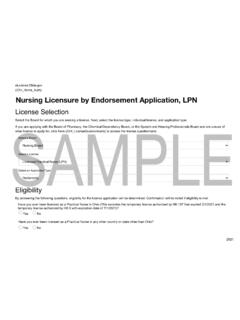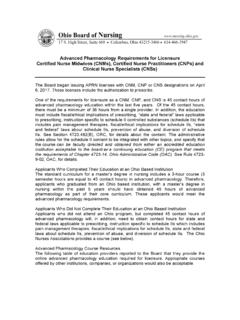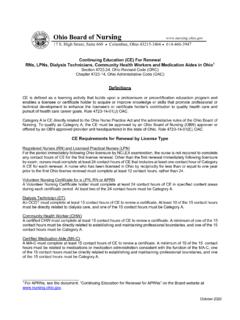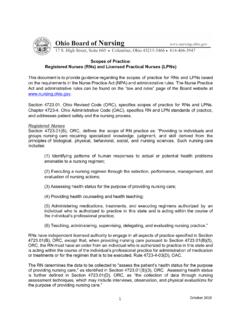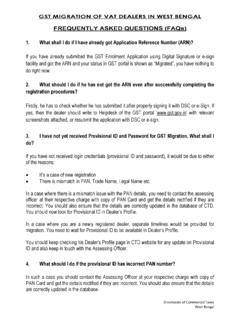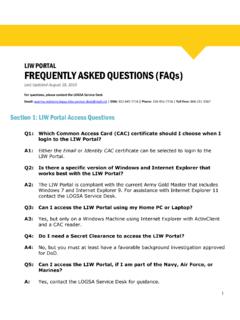Transcription of RN and LPN Frequently Asked Questions - State of …
1 RN and LPN Frequently Asked Questions 1. How do I know if a specific procedure or activity is within my scope of practice? The scope of practice for nurses can be found in Ohio Revised Code (ORC) Section (B) for the Registered Nurse (RN), and (F) for the Licensed Practical Nurse (LPN). To determine whether a procedure or activity is within an individual nurse's scope of practice, a nurse may utilize the Decision Making Model available on the Board of Nursing website at (click on the Practice RN and LPN link). In addition, for information on specific nursing practices, see the Interpretative Guidelines on the same web page. 2. Is a LPN authorized to perform venipuncture to obtain blood samples for laboratory analysis? Section (F)(3), ORC, authorizes a LPN to administer treatments authorized by a individual who is authorized to practice in Ohio and is acting within the course of the individual's professional practice.
2 Rule 4723-4-04 (D), OAC, provides that when the LPN is providing nursing care that is beyond the basic preparation for a LPN, in addition to having a specific current order or direction from the authorizing individual (for example, direction from an RN or a physician order), the LPN must also have documentation of obtaining the necessary education, knowledge, skills and abilities to provide the directed or ordered nursing care. Therefore, an LPN who is skilled and competent in performing phlebotomy to obtain blood samples may do so with a specific order or direction. 3. Can a LPN or RN accept employment as a patient care assistant? The Nurse Practice Act does not prohibit a nurse from limiting his/her employment responsibilities to that of a patient care assistant or other unlicensed personnel.
3 The licensed nurse that accepts employment in a position that does not require a nursing license and who chooses not to engage in licensed nursing practice should not identify him/herself as a nurse. If the individual identifies him or herself as a nurse or engages in the practice of nursing, the individual will be accountable under the Nurse Practice Act and administrative rules. May the nurse also accept employment as a State tested nursing assistant (STNA) in a licensed nursing home? The above response applies to this question , but it should be noted that STNAs are regulated by the Ohio Department of Health (ODH). You should contact ODH regarding its requirements to be recognized on its registry as an STNA. The information contained in this FAQ reflects the law and rules in effect 06/11/2015.
4 4. What is the LPN's authorized practice with respect to assessing a patient? The scope of practice for LPNs is set forth in Section (F), ORC. As specifically noted in their scope, RNs may assess health status for the purpose of providing nursing care. RNs may identify, organize, assimilate and interpret data with respect to the patient to determine the patient's health status and the nursing needs of the patient. LPNs provide nursing care requiring the application of basic knowledge of the biological, behavioral, social and nursing sciences at the direction of a licensed physician, dentist, podiatrist, optometrist, chiropractor or RN. Assessment of a patient's health status is not included in the LPN scope of practice. LPNs contribute to the registered nurse's assessment of the patient's health status by collecting and documenting objective and subjective patient data and reporting that data as appropriate to the directing registered nurse and other members of the healthcare team, consistent with Rule 4723-4- 08, OAC, Standards for applying the nursing process as a licensed practical nurse.
5 The objective and subjective data collected, documented and reported by the LPN may include but is not limited to the LPN's physical and psychosocial findings of patients ( , auscultation of abnormal breath sounds or heart sounds, identification of unusual patient behaviors). 5. Can a RN or LPN accept a verbal order or an order that has been electronically transmitted ( faxed, texted, emailed)? The Nurse Practice Act does not address the manner, mode of transmission, or format in which an order is received, relayed or transcribed by a nurse. Rather, Chapter 4723-4, OAC, places accountability on the nurse who is implementing the order to implement or clarify that the order is accurate, valid, properly authorized and is not harmful or potentially harmful to the patient, or is not contraindicated by documented information.
6 The nurse implementing the order is required to seek clarification of the order when the nurse believes or has reason to believe one of these contraindications exist, and to take any other action necessary to assure the safety of the patient. 6. What is the nurse to patient ratio in a hospital setting or longterm care setting? The Nurse Practice Act does not specify nurse to patient ratios or nurse staffing levels in ANY patient care setting. Other regulatory or certifying bodies such as the Ohio Department of Health, or The Joint Commission may address staff to patient ratios. Specific to hospitals, legislation enacted in 2008 requires hospitals to create and maintain committees to address nursing staffing levels. 7. Can a nurse administer a medication such as Methotrexate, as ordered by a physician, to terminate an ectopic pregnancy?
7 The Ohio Nurse Practice Act prohibits a nurse from administering medication to terminate a live pregnancy which includes all pregnancies unless it is known that the fetus or embryo has stopped developing and the tissue is dead. For further information regarding this question see the article Administering Medications Relating to the Termination of a Pregnancy in the Winter 2007 issue of Momentum, available on The information contained in this FAQ reflects the law and rules in effect 06/11/2015. the Board of Nursing website under Publications. 8. What procedures or activities can a nurse perform using a laser or a light based medical device? According to Medical Board rules, a physician may delegate the use of light based medical devices to RNs and LPNs only for the purpose of hair removal, and to appropriate persons for light phototherapy for the treatment of hyperbilirubinemia in neonates and for fluorescent lamp phototherapy for the treatment of psoriasis and similar skin conditions.
8 For additional information see the article, The Use of Light Based-Medical Devices . in the Winter 2008 issue of Momentum, available on the Board of Nursing website under Publications. 9. What is the maximum number of hours a nurse may work in a specified period of time? The Nurse Practice Act does not address employment matters, such as work schedules, nor does it establish limits on the number of hours a licensee may practice within a given period of time. However, nurses must be knowledgeable of the standards of nursing practice in Rule 4723-4-03, OAC. (related to RN practice), and Rule 4723-4-04, OAC (related to LPN practice). These rules require RNs and LPNs to "demonstrate competence and accountability in all areas of practice in which the nurse is engaged which includes, but is not limited to: 1) consistent performance of all aspects of nursing care; and 2) appropriate recognition, referral or consultation and intervention when a complication arises.
9 " In addition, all nurses are required to maintain a safe environment for the patient. Rule 4723-4-06(H), OAC. Working under conditions of fatigue may not be safe for the nurse or the patient. A nurse who fails to demonstrate competence or does not provide consistent performance within his or her nursing practice as a result of excessive work hours, or for any other reason, will not have met standards of safe practice. 10. Are nurses required to have malpractice or liability insurance? The Nurse Practice Act does not require nurses to maintain malpractice or liability insurance coverage. 11. Who may supervise the practice of nursing? Section (B), ORC, states that the supervision and evaluation of nursing practice is within the RN. scope of practice. Rule 4723-4-06(O), OAC, further states that only a RN may supervise and evaluate the practice of nursing by other RNs or LPNs.
10 LPNs are not prohibited from participating in activities which contribute to the delivery of care services, such as scheduling nursing services and providing observation and documentation regarding care provided by assistive personnel. A non-nurse supervisor may evaluate a nurse employee in matters other than the practice of nursing ( , personnel issues such as attendance). 12. Are RNs and LPNs required to maintain CPR certification? The Nurse Practice Act does not require RNs or LPNs to obtain and maintain certification in CPR. Rather, the standards of practice for RNs and LPNs in Chapter 4723-4, The information contained in this FAQ reflects the law and rules in effect 06/11/2015. OAC, require nurses to demonstrate competence and accountability in all areas of practice in which the nurse is engaged which includes, but is not limited to, recognition, referral or consultation, and intervention when a complications arises.
